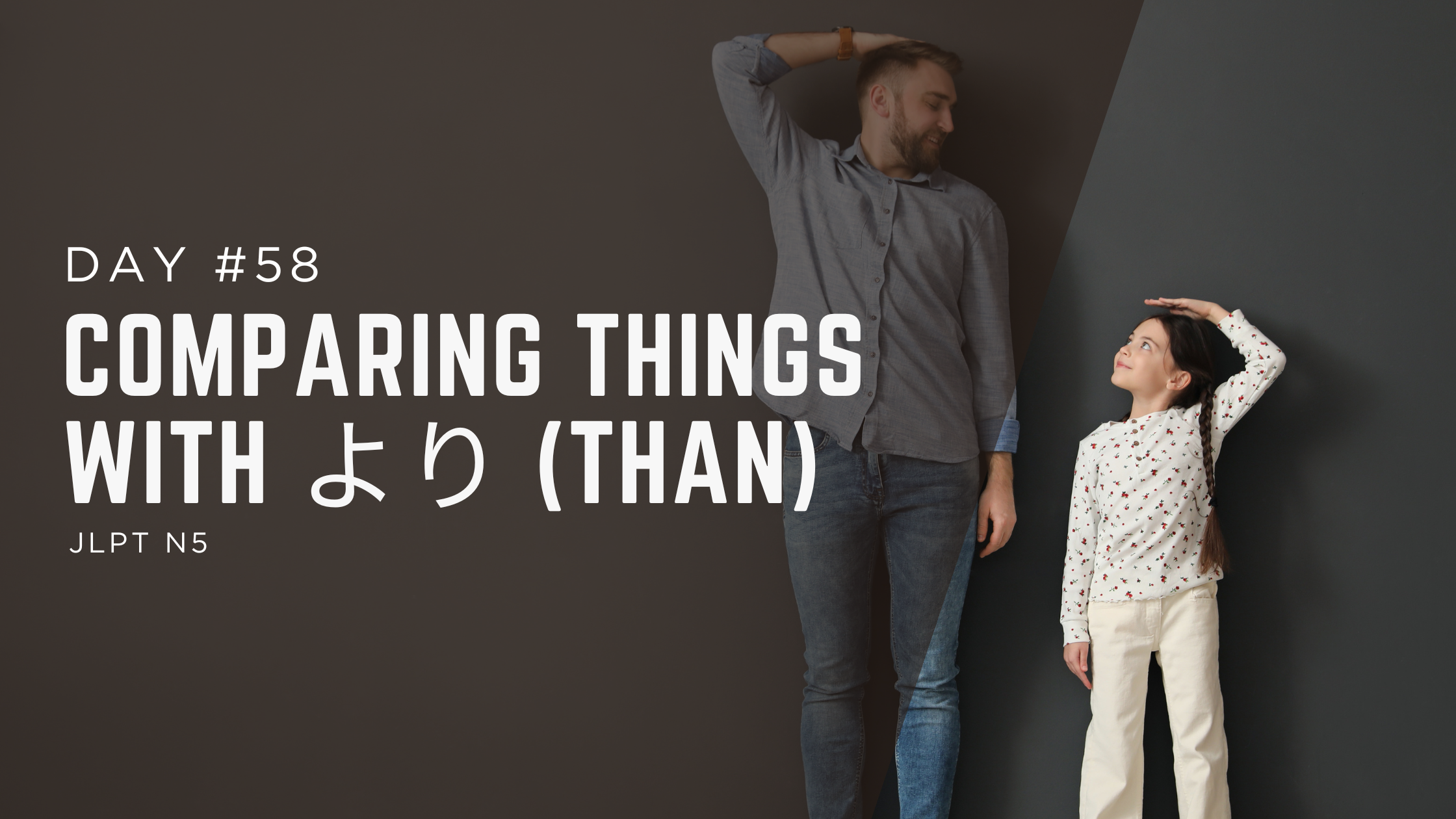Welcome to Day 58 of your 100-day Japanese challenge!
Today, we are going to learn より, a grammar point that allows you to compare two things. Comparisons are essential in everyday conversations.
Whether you’re talking about food, weather, or travel, knowing how to say “X is more than Y” makes your Japanese sound natural and confident.
Main Lesson: How to Use より
Meaning
より means “than” in English. It is used to compare two nouns, showing which one has more of a quality, quantity, or degree.
Example:
この くつ は あの くつ より たかい。
(Kono kutsu wa ano kutsu yori takai.)
These shoes are more expensive than those shoes.
Structure:
[Noun A] は [Noun B] より [adjective]
- Noun A = the thing you are describing
- Noun B = the thing you are comparing to
- Adjective = the quality you are comparing
Polite and casual forms work the same way.
Key Notes:
より is only used for comparisons between two nouns.
Common adjectives used with より include:
たかい (expensive / tall)
やすい (cheap)
おおきい (big)
ちいさい (small)
はやい (fast)
おそい (slow)
For na-adjectives, use them directly:
この たてもの は あの たてもの より たかい です。
This building is taller than that building.
Vocabulary lists
| Verbs | Romaji | Meaning |
|---|---|---|
| およぐ | oyogu | to swim |
| あそぶ | asobu | to play |
| あるく | aruku | to walk |
| Nouns | Romaji | Meaning |
|---|---|---|
| こうえん | kouen | park |
| にわ | niwa | garden; yard |
| きょうしつ | kyoushitsu | classroom |
| どうぶつえん | doubutsuen | zoo |
| いけ | ike | pond |
| うみ | umi | sea; ocean |
| やおや | yaoya | vegetable shop |
| はなや | hanaya | flower shop |
| Adjectives | Romaji | Meaning |
|---|---|---|
| おおきい | ookii | big / large |
| しずか | shizuka | quiet |
| にぎやか | nigiyaka | lively / busy |
| たのしい | tanoshii | fun / enjoyable |
| たかい | takai | tall / high |
| つかれる | tsukareru | tired |
Example Sentences
この こうえん は にわ より おおきい です。
(Kono kouen wa niwa yori ookii desu.)
This park is bigger than the plaza.
としょかん は きょうしつ より しずか です。
(Toshokan wa kyoushitsu yori shizuka desu.)
The library is quieter than the classroom.
どうぶつえん は こうえん より にぎやか です。
(Doubutsuen wa kouen yori nigiyaka desu.)
The zoo is more lively than the park.
うみ は いけ より おおきい です。
(Umi wa ike yori ookii desu.)
The sea is bigger than the pound.
わたし の いえ から やおや は はなや より ちかく に あります。
(Watashi no ie kara yaoya wa hanaya yori chikaku ni arimasu.)
The vegetable shop is closer to my house than the flower shop.
およぐ の は あるく より つかれます。
(Oyogu no wa aruku yori tsukaremasu.)
Swimming is more tiring than walking.
こうえん で あそぶ の は いえ で あそぶ より たのしい です。
(Kouen de asobu no wa ie de asobu yori tanoshii desu.)
Playing in the park is more fun than playing in the house.
Conclusion
Today, you learned より, the Japanese word for “than.” Using より lets you compare objects, people, and places naturally.
Remember the structure: [Noun A] は [Noun B] より [adjective].
Practice by describing your favorite places, foods, or travel options. Consistent daily practice is the key to mastering JLPT N5 grammar!



